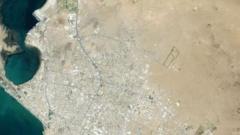In the aftermath of Syria's civil war, the Druse minority is advocating for their rights and safety, seeking assurances from Western officials regarding their protection as the nation rebuilds under rebel leadership.
Druse Community Seeks Assurance Amid Shifting Power Dynamics in Syria

Druse Community Seeks Assurance Amid Shifting Power Dynamics in Syria
As Syria transitions power away from the Assad regime, the Druse minority aims to secure protections and address concerns about their future under a new government.
In a significant shift following Syria's protracted civil war, the Druse community, a minority religious group, has launched a diplomatic campaign to secure their safety and rights as the country transitions to a new government. Sheikh Muwafaq Tarif, a spokesperson for the Druse, recently visited Washington, where he appealed to lawmakers and diplomats from both the Biden and Trump administrations to ensure protections for the 1.2 million Druse inhabitants in Syria.
The backdrop of this plea is the recent defeat of President Bashar al-Assad's regime by a coalition of Syrian rebels, which resulted in the formation of an interim government. However, the rebels, now in power as Hayat Tahrir al-Sham, were previously associated with terrorist groups like Al-Qaeda and the Islamic State, raising concerns for Western nations about their intentions and the potential implications for minority groups.
Despite rebel assurances of a more tolerant Syrian society, skepticism lingers among the Druse community. Sheikh Hikmat al-Hajari, their spiritual leader, has expressed doubt about the commitments made by Ahmad al-Shara, the de facto leader of the rebels. The apprehension stems from a historical context of religious persecution and a yearning for security amidst a landscape of shifting allegiances and power dynamics.
While Western officials are keen on engaging with the new administration to foster reconstruction efforts in Syria, the Druse and other minority groups remain vigilant. Their survival and stability depend on concrete guarantees from the international community, ensuring that their rights will be upheld in a post-Assad political landscape.




















